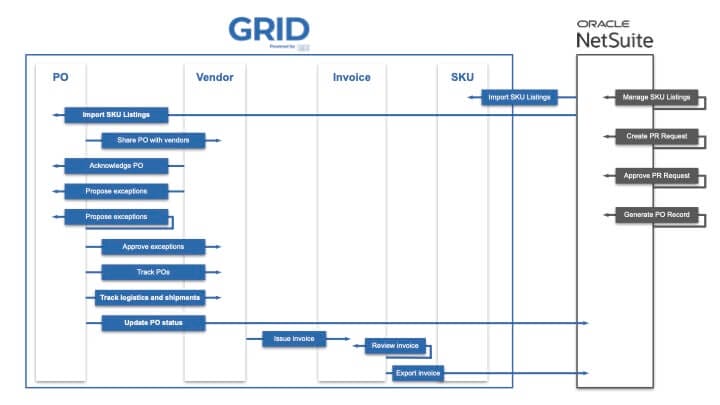Integrations can be powerful ways to drive higher return on investment from the underlying systems and ERPs. While in many instances the GRID is brought in as the system of record for product, sourcing, and order data – i.e., as the PIM (Product Information Management) or SRM (Souring Relationship Management System) or ERP (Enterprise Resource Planning) – the GRID is equally as often brought in to integrate and provide connective tissue on top of existing systems. We are excited about playing in either role since each delivers tangible outcomes, both qualitative and quantitative, for our customers.
Netsuite is one of our most popular and high-volume integration points. We achieve customer success because of four primary factors amongst others:
- Collaborative network platform and functionality on master data
The GRID provides collaboration, project management, and data reporting and visualisation layers as an interactive layer on master data that the GRID pulls from Netsuite or with master data created and maintained on the GRID. - Democratising and expanding access
The GRID expands user access to underlying Netsuite data, and data created on the GRID, to more communities and more people within these communities. That is, more suppliers, more people within the companies’ operations, procurement and product teams, more warehouses and freight forwarders. - De-commissioning excel sheets, manual work and emails
Even with a Netsuite investment, many actions and workflows still happen on excel, smart-sheets, google sheets and phone calls. The GRID de-commissions these manual tasks and digitises the huge task load of work still being done away from Netsuite. - Connecting people, data, and workflows for accessible intelligence
By digitising excel sheet work, and expanding access to Netsuite data, the GRID connects people and workflows towards an intelligent bed of reports and visually prescriptive dashboards.
General flow of data between GRID and Netsuite
- SKU Listings are created in the GRID or in Netsuite. If cerated in Netsuite, they are integrated or imported into the GRID.
- Collaboration and project management of new products and existing products’ edits are managed on the GRID.
- The vendor master with metrics to measure quality and lead times is created and managed on the GRID.
- Once a purchase requisition (PR) is ready to be issued, the PR is created and approved/rejected in Netsuite or on the GRID.
- If created in Netsuite, the PR is upgraded to a PO (Purchase Order) and is imported into the GRID.
- The entire PO lifecycle and collaboration with the vendors is managed on the GRID:
- The PO (purchase order) is issued to the supplier.
- The supplier acknowledges that purchase order.
- The supplier proposes exceptions as applicable throughout the lifecycle of the purchase order.
- Supplier exceptions are approved or rejected as applicable.
- Relevant files and communications within the internal team and with the supplier are managed on the GRID along the lifecycle of the purchase order.
- The phases and stages of the purchase order, timelines, dependencies, checklists, assigned owners, and all other aspects of the purchase order project tracker are managed on the GRID.
- Delivery management and splits of purchase orders across packing lists, and shipments are done on the GRID.
- Similar to the purchase order, shipments are created in Netsuite or the GRID. If created in Netsuite, the shipment records are imported into the GRID.
- All logistics milestones and shipments’ tracking are managed on the GRID
- Cargo optimisation across modes of transport, assignment to warehouse locations, calculations of under shipments and over shipments are managed on the GRID.
- Reconciliation of actual versus shipped quantities is managed on the GRID.
- Receipt of actual quantities is tracked on the GRID.
- Based on reconciled quantities, final invoices are issued on the GRID, and data is pushed to Netsuite’s financial module.
- Reconciliation of final invoices is performed considering payment terms, deposits issued, chargebacks as applicable, and discounts.
- Connected data sets that have now been imported, created and managed on the GRID across sales orders, SKU information, vendor data, purchase orders issued, purchase orders in transit, inventory levels, and other future variables like new products to be introduced, marketing investments’ changes, macroeconomic variables are used to inform a demand plan and forecast on the GRID.

Why GRID and Netsuite together – high-usage functionality, workflows and use
cases.
The success of the GRID and Netsuite integration has been proven based on our measurement of usage metrics across GRID functionality themes that see a consistent pattern of high adoption.
- Digital Asset Management
Master data from Netsuite is enhanced with the GRID users’ ability to share and manage unlimited files of diverse types both internally and with suppliers. - Collaboration across brand and operations managers, and suppliers
GRID users chat, comment, manage notifications, integrate email threads, make assignments, and hold team members and groups accountable on tasks managed on top of Netsuite or GRID created master data. - Tracking, Visibility, and Project Management across Product Conception, Purchase Orders and Shipments
GRID users manage project phases and stages, expected timelines, dependencies, checklists, and calendars on top of Netsuite or GRID created master data. - Use as a Supplier and Customer Portal
Since access is expanded because of better price points per user, and because the GRID interface is easier to use, the GRID functions as the user portal of choice for suppliers and customers. - Monitoring Key Performance Indicators (KPIs)
There are far more transactional, operational, and granular data points managed on the GRID. This is combination with the platform’s role as connective tissue has made it an effective data bed to report on data KPIs, including reporting on data that is integrated from Netsuite. - Managing split and short shipments, and reconciliations
In the real world, issued purchase orders are rarely all shipped at once or in the same quantity as the issued quantity. The GRID’s much needed functionality to manage split shipments, over and under shipments, and final reconciliations are all heavily used workflows on top of purchase order data imported from Netsuite. - Acknowledgement and Exceptions Management
Every action and exception needs to be categorised, acknowledged, approved or rejected to better track supply chain performance. These layers of approvals, and exceptions managements are heavy-usage GRID workflows on top of purchase order and shipments data imported from Netsuite. - Quality Assurance and Metrics tracking across Product and Purchase Order Lifecycle
Quality metrics are important to define, measure and track across product conception, vendors profiles, purchase orders, and shipments. This quality assurance maintenance and tracking process is managed on the GRID.
Suuchi Ramesh
Founder, CEO
Suuchi Inc.
To find out more about our integrations please visit www.suuchi.com or write us at hello@suuchi.com
